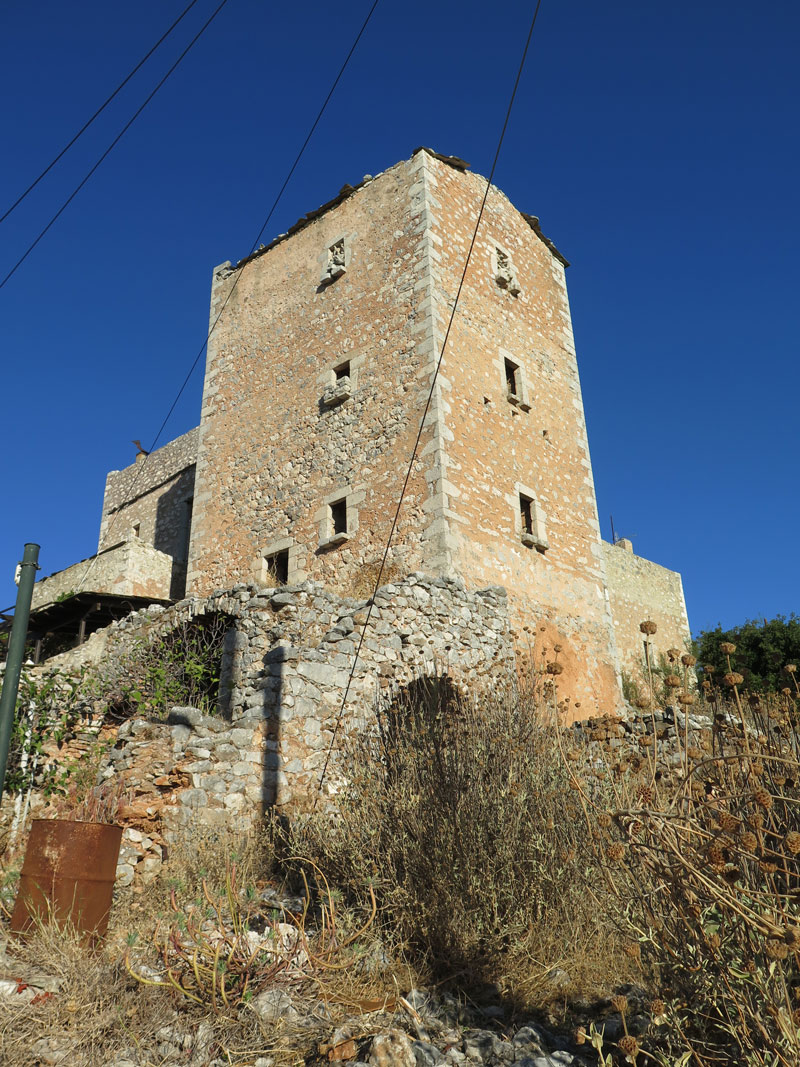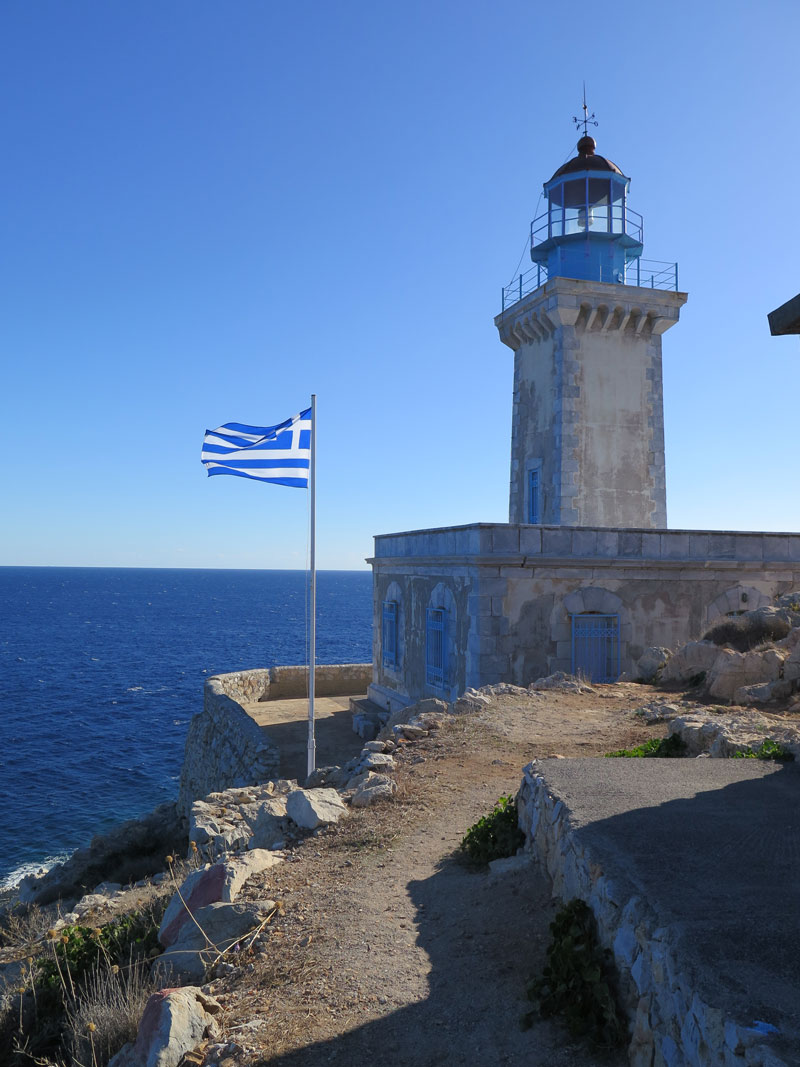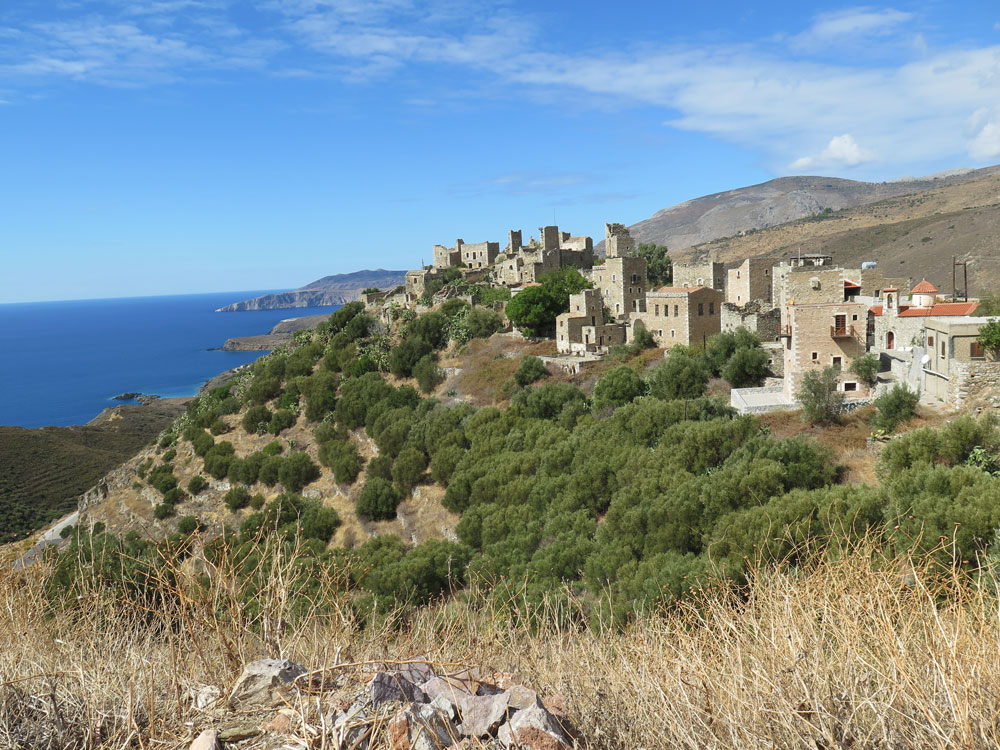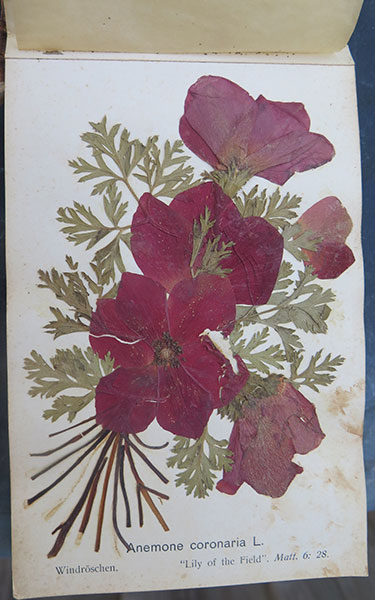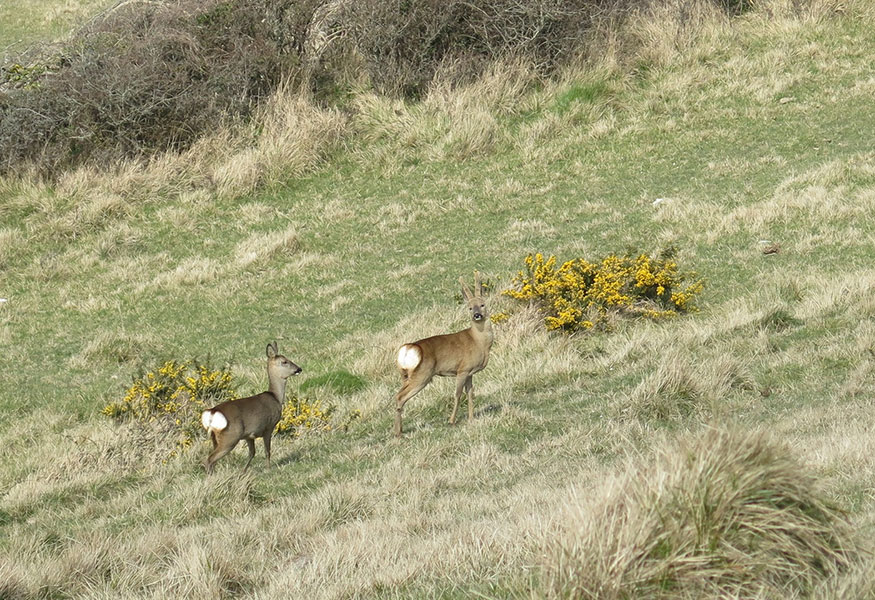37. Mani 2 – Walking Towards Africa
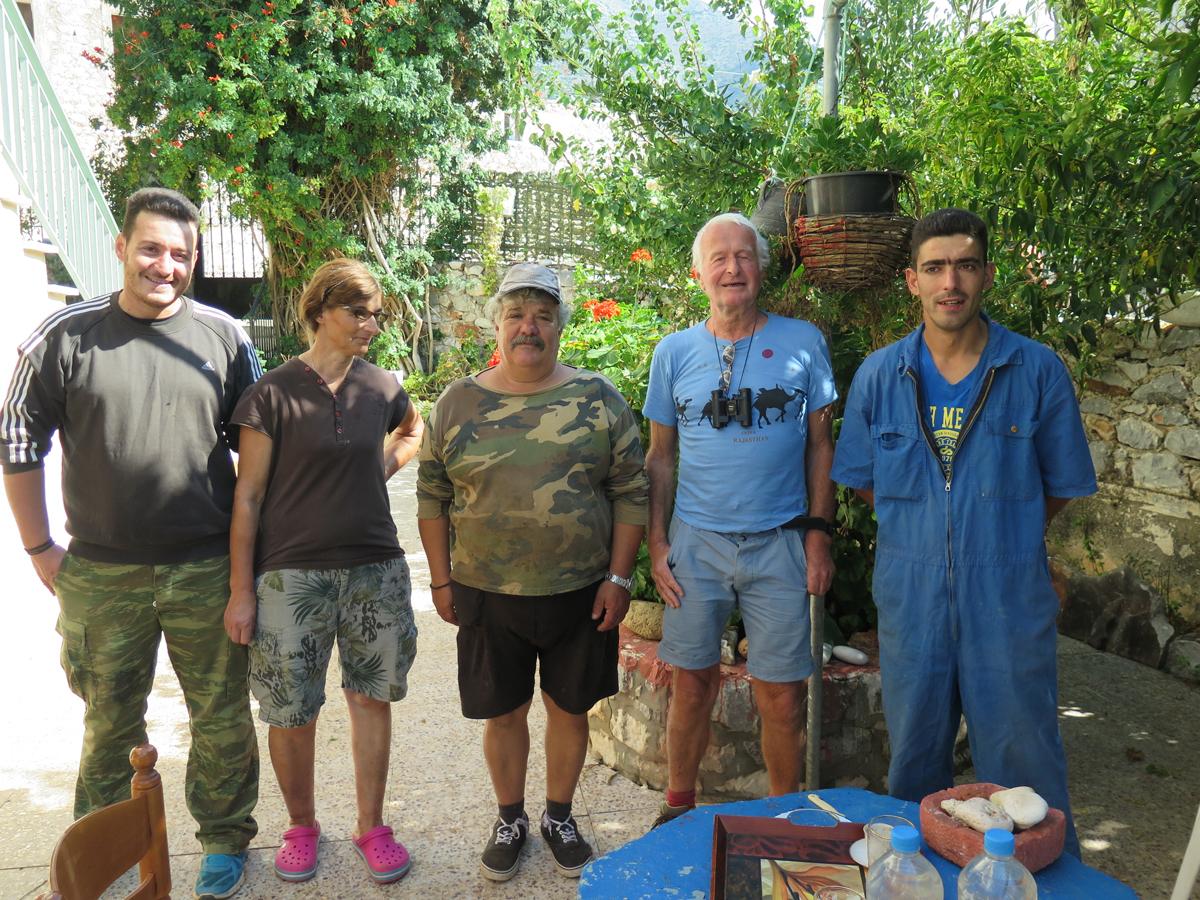
36. Mani – The End Of Europe 1
December 31, 2020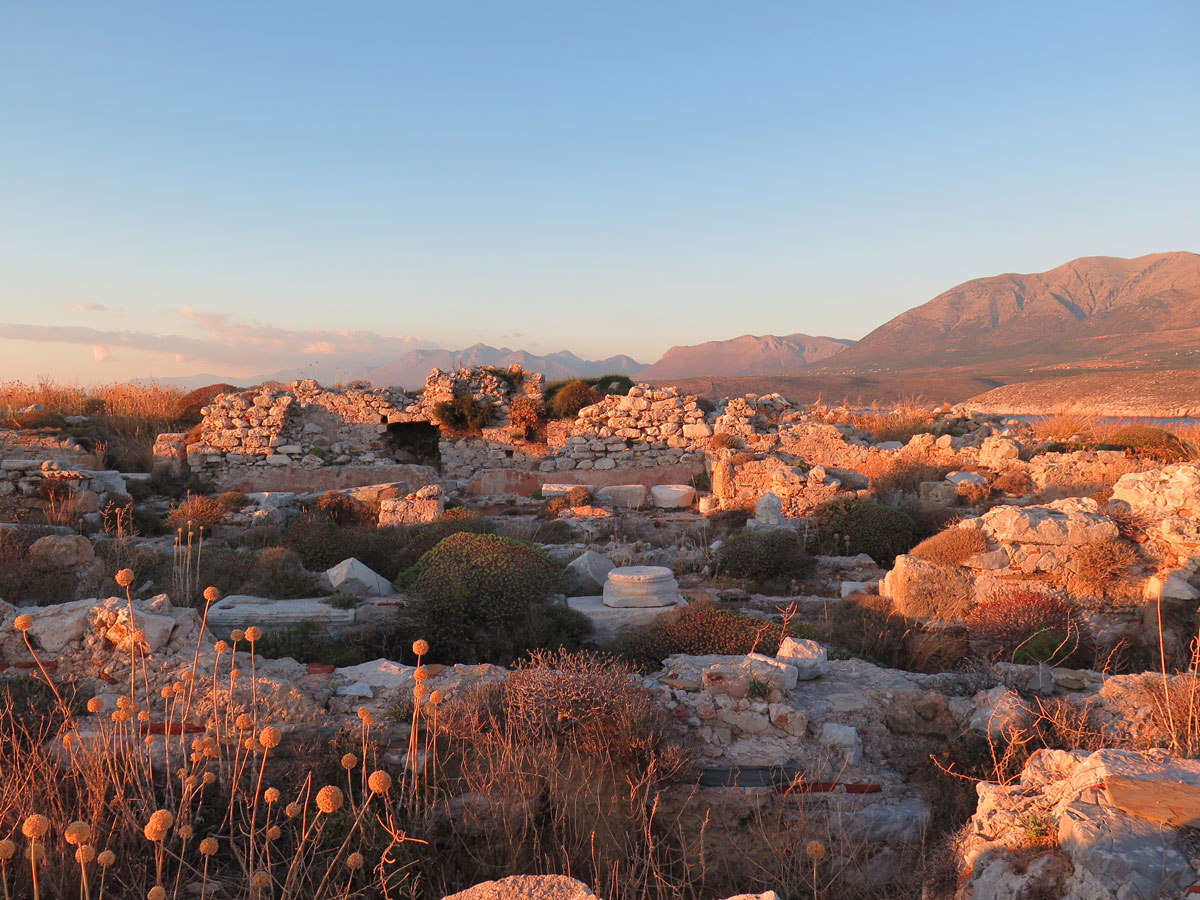
38. Mani 3 – Ghosts And Jackals
January 14, 2021A lift back to Flomochori and breakfast at the old lady's bar. Age brings regular pills; having dropped mine on the summit of the ridge I had replaced all but one in Kotronas. Of that one the pharmacist said in Greece they rarely issued so weak a dosage. With a stiff northerly breeze under a cloudless sky, I regained the main road then sought to evade it by a parallel diversion towards Argillias. Soon a sign marked the footpath, which was as vague as the others we tried, losing itself amongst summer-dried undergrowth. Was it the sage-like plant that set me coughing? There were mauve crocus flowers; high on the ridge they had been yellow or pristine white. When the track was clearest fierce territorial fences crossed it to keep man and beast from olive groves. Below, the dark blue sea was crinkled by the wind.
Argillias proved small and largely abandoned. A hose dribbled at the base of a valued tree. Beyond, a minor road left southwards clinging to the side of bare-headed hills. A man in a battered pick-up stopped to ask why I took this minor route. He seemed suspicious, hostile but was merely sympathetic towards someone so foolish. It led to larger but no less desolate Drimos where a woman watering a garden deflected her hose to fill my bottle. Drimos, like every little town in Mani, is crowned by rubble-built, small-windowed square towers three or four stories high built to repulse feuding neighbours. Almost all are derelict and their beams, decaying, have let the floors fall.
A rough track paved with great slabs of stone meandered down through the village towards the coast road. Fly-tipping is widespread and the garden of a last deserted house had been chosen for dumping old mattresses and rubbish. On the main road a sign indicated Kokkala and a supermarket 6 km ahead. Food! Hungry, I walked faster passed only by a striking black, low-slung BMW. Just after two o'clock the supermarket appeared – complete with another sign 'closed at 2'. It was prompt. With a burst of abuse, I entered the plain seaside town, its ruined towers manicured, and retreated to the shore. Kokkala seemed empty save for three youths fishing who pointed out another, smaller shop. There, aided by her proud mother, a little girl served me water and a very synthetic ice-cream.
It was hot. I passed a little bay and crossed scrubby sand to bathe from its thinly populated beach. There was an air of privacy. Refreshed, returning towards the road I saw a 'private' sign; the beach belonged to 'The Malibu Club'. Further on a massive, heavily-laden motorbike stood by the roadside. Below it an equally massive naked German, watched by his topless girlfriend, lowered himself gingerly through rocks into the sea.
In the next seaside town I missed a turning but, by scrambling over fences through the dead settlement, regained the road. The wind increased on the steep ascent to Lagia. There, a woman with a wheelie bin said there was nowhere to stay but indicated a taverna. The smartly-dressed owner rose to introduce himself as Father George. Both the taverna and the smart black BMW that passed me earlier were his as was the new church opposite. He showed me inside; it had poor murals by painters from Athens. The guest house was closed for the winter but he could suggest a sheltered place to sleep and pointed out recesses in nearby ruins; in one a sheet of cardboard was laid out. Unfussy, I approved each in turn. But he relented and handed me the key to a spare room complete with attached bathroom then advised wisely on the taverna's menu. Fifty years ago Lagia's population was 800; now it is 50. There is no work, nothing to retain youths who have all Europe to enjoy. Landowners came each year to harvest and crush their olives; there was little else to keep them. He left me to the tall, bearded manager whose father owned a honey farm, so the meal ended well with honey and yoghurt.
A wonderful, silent night broke when the church bell rang. Over the sea a deep orange line grew and lightened. I rose with the sun. At breakfast the manager said his father was also a sculptor. I had noticed some of his work and mentioned the painter following me – that should earn Toby a bed - then left to look around the place before a long descent through utter silence – no cars, no voices, no machines only my footfall past strong-smelling ragwort.
Near the end of the peninsula, I found a room overlooking the sea. In a taverna the young waiter had fair English. What was it like for work in London? We understood each other: he had to escape. Was it his mother who appeared occasionally from the kitchen? She would be heart-broken when he went. An English couple joined me and, good company, we drank too much wine. He mentioned the poet, Rupert Brooke's Greek gravestone inscribed 'Forever England' – a narrow vision! Everyone has such an 'England'.
In the morning, thin cats wandered the tables, mewed, gazed at my breakfast. Four variably overweight men clad in bright orange tee-shirts barged in. Buddhists? Their faces didn't suit piety! As I paid, the waiter said disparagingly ‘Hunters. They come from other villages. The orange is so they don't shoot each other.’ It wasn't far to Cape Matapan, a rough path to the southern tip of Europe. I remembered two greenish retired motor torpedo boats, 'Anzio' and 'Matapan', which once plied the Dorset coast. Beside a lighthouse the Greek flag fluttered – a good one, theirs, clean blue and white. Beyond the horizon lay unknown Africa.
I moved to the beach, swam and lay watching grayling-like butterflies collect near the sea edge - salt? - then left, recrossing the peninsula's narrow neck to rise along dry hillside before abruptly turning a corner to confront Vathia, a hilltop collection of stone houses and empty towers. Here was a roadside taverna with a view. As I sat outside with a beer, Toby texted. He was close by, descending from nearby Chora, and would join me.
Together we explored the silent buildings as dusk advanced and chose an empty house complete with olive crusher, a rusty metal bed frame and unreliable chairs. Picking a room with a seaside view, we slept.

